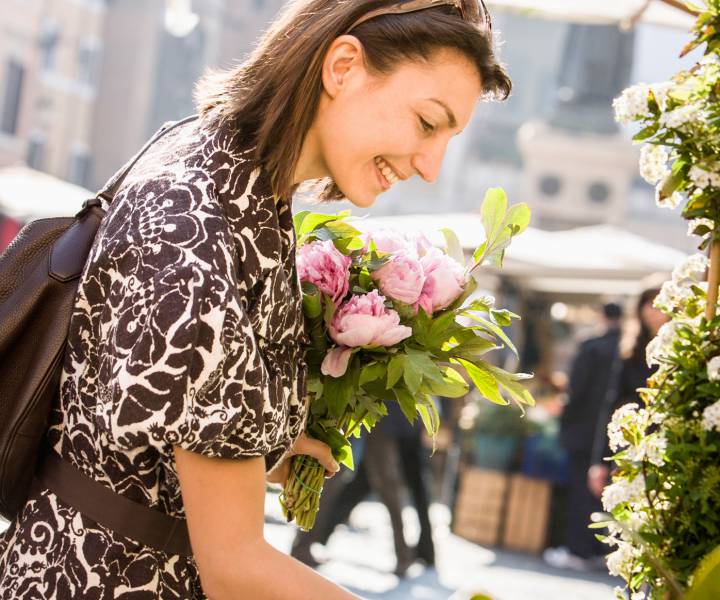Health
Why spoiling yourself makes you happier
by Flic Everett

When the weather’s a washout, I buy flowers. Not pricey hothouse blooms, just modest, basic ones – such as daffodils and tulips – to put on the windowsills and bring a burst of colour and life to my grey kitchen.
My friend Sarah buys herself a new paperback when she needs a lift. Nothing too heavy – prize-winning literary novels have their place, but not after a long day in the office. And my chic friend Julia can’t say no to a new lipstick when she’s feeling fed up. ‘It cheers me up as much as a new dress,’ she says.
In fact, sometimes, a little treat makes me feel better than a big one. Buying something expensive can trigger waves of financial guilt, and I end up doing panicky maths all the way home; ‘Well, if I don’t eat till next Thursday, cancel the holiday, sell the family silver, I can probably justify it…’ But a small treat is like an unexpected flirtation, instead of a major, guilty affair. It lifts your self-confidence, makes you feel good, and eases the daily grind.
‘Studies have shown that when we give ourselves treats, we feel happy, indulged and contented, which boosts our self-esteem,’ says psychotherapist and hypnotherapist Susan Hepburn. ‘It helps to change your mindset, and the difference a small treat can make on the happiness scale is quite amazing.’
A treat is something that lifts your mood. For some people, it’s a fancy cup of coffee but, for me – a non-coffee drinker – that just means palpitations. And my treat of a new notebook and gel pen might remind others of bad times at school. A treat is entirely personal.
‘When we notice our pleasure and relish it, the experience becomes much more of a treat,’ says Gretchen Rubin, bestselling author of The Happiness Project (HarperCollins, £10.99). ‘Even something as humble as herbal tea can qualify.’
Let’s face it, we could all do with a little boost – so here’s why you should make the most of your tiny treats.
Treats help you focus
If I have a lot to do, my attention often wanders, and suddenly I’m wondering whether I should dye my hair red, or find myself scrolling through Hollywood gossip online. But it turns out mini treats can help concentration, says Julia Cole, psychotherapist at Priory’s Wellbeing Centre in Southampton. ‘It’s important to use treats as rewards,’ she explains. ‘So, mundane tasks such as working through emails, or scrubbing the bath are followed by something to lift your spirits. The prospect of a treat – it doesn’t have to be big – will help you to tackle the tasks you dread.’
Self-indulgence is ok
We have a deep-seated sense that we don’t ‘deserve’ treats, and the ‘Oh, I couldn’t’ runs through many of us, so we deny ourselves. Then we wonder why we feel taken for granted and resentful.
‘Self-indulgence has a bad press because we have a work ethic that our constantly on-the-go society has bought into,’ says Julia Cole. ‘We look at others and think “they are carrying on, so I should too,” but, in reality, they are probably as exhausted and stressed as you are. So anything that helps you feel good about yourself is worth it.’
When I had a very stressful job, I’d spend the morning looking forward to my lunchtime walk around the park. It was a little moment of tranquillity and focus – and I’d then follow it up, on particularly bad days, with a raspberry liquorice log, my favourite sweet. It didn’t make the job less difficult, but it definitely helped me to cope better.
You're worth it (really)
‘Because I’m worth it’ is a memorable ad slogan, but most of us struggle to believe it. If I’m feeling gloomy, I’m not in the market for winking at the mirror before treating myself, I’m just trying to get through the day. But, according to the experts, treating yourself is a way of remembering that actually, you are worth it. ‘Often, we feel that it’s wrong to treat ourselves, but we wouldn’t think twice about treating a loved one,’ says Susan Hepburn. ‘Studies have shown that treats help us to value ourselves. So treats are not selfish, they’re essential to our wellbeing.’
But, don't confuse treats with fixes
A treat gives your day an upbeat moment that leaves you feeling better. Every time I look at those daffodils, I feel a bit jollier, as if the sun might actually make an appearance. But if your ‘treat’ is making you feel worse, it’s not really a treat at all.
‘“A little of what you fancy does you good” is true for personal treats,’ says Julia Cole. ‘Small amounts, little and as often as you feel you need them, should be your mantra. But, if you notice a large intake of sugar, fat or alcohol – so not just a small amount of chocolate, but the whole bar, or bottle of wine or family bag of crisps – every time you feel stressed, you are not dealing with the root cause of your problems,’ she adds.
The basic rule is that a treat should make you feel better, not worse.












